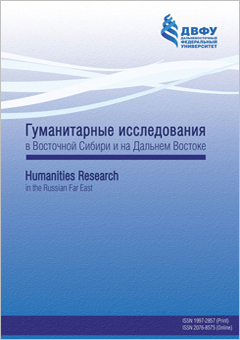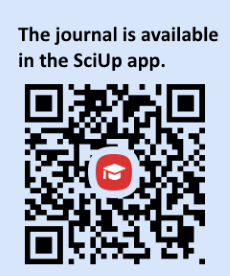Publication ethics
The Editorial Board of the Humanities Research in the Russian Far East adheres to internationally accepted standards of publication ethics including the guidelines provided by the Association of Science Editors and Publishers (ASEP) Ethics Council and the Committee on Publication Ethics (COPE).
The Editorial Board of our journal officially endorses the principles of the San Francisco Declaration on Research Assessment (DORA). In our editorial practice, this commitment translates into the following actions:
– promoting responsible authorship and research integrity;
– selecting peer reviewers based on their scholarly expertise rather than bibliometric indicators;
– making publication decisions by prioritizing a work's scientific merit over citation counts or author affiliations;
– not imposing limits on the number of references in research articles and encouraging citations of primary sources rather than derivative publications in so-called "prestigious" journals;
– advancing the value of regional humanities research within global scholarly discourse.
Ethical Principles of the Editorial Board
General Principles
In its activities, the journal’s editorial board strives to:
– maintain practices that ensure the quality of published materials;
– uphold the principles of academic integrity;
– continuously improve the journal;
– protect freedom of opinion;
– prevent commercial interests from compromising intellectual and ethical standards or influencing editorial decisions.
Commitments
The journal’s editorial board is committed to:
– ensuring that all submitted manuscripts undergo peer review by qualified experts;
– maintaining a reviewer database that reflects the journal’s academic community, expanding it with new reviewers when necessary and utilizing a wide range of sources, including bibliographic databases, to identify potential reviewers;
– considering potential conflicts of interest when selecting reviewers and requesting that reviewers disclose any potential conflicts of interest before the peer review process begins;
– making publication decisions based on a manuscript’s scientific merit and relevance to the journal’s scope, regardless of the author’s gender, nationality, race, political views, religion, etc.;
– ensuring the confidentiality of submitted materials during the peer review process;
– screening all submissions for plagiarism and data falsification using the "Antiplagiat" system;
– taking measures to prevent honorary, gift, and purchased authorship, as well as redundant publications;
– maintaining regular communication with authors, informing them of key stages in the manuscript review process;
– providing authors with the opportunity to review pre-publication proofs to ensure content accuracy;
– promptly reviewing complaints and appeals regarding editorial decisions, violations of publication ethics, and other contentious matters related to the journal's operations. Editorial staff will conduct necessary investigations and inform complainants of the outcomes. To submit a complaint or appeal, please send an email to the journal's official address (gisdv@dvfu.ru) detailing the nature of the issue and attaching supporting evidence;
– always be prepared to publish corrections, clarifications, retractions, and apologies when necessary;
– implementing systems that allow authors and readers quick and open access to original research articles;
– refraining from any attempts to improperly influence the journal’s ranking by artificially inflating its metrics.
Peer Review Ethics
Manuscripts submitted to the editorial office are reviewed in accordance with the Journal’s Peer Review Policy.
Conflict of Interest
Reviewers must declare any potential conflicts of interest prior to agreeing to review a manuscript. A reviewer should decline to review if a conflict exists, including but not limited to: a) competitive or collaborative relationships with the authors; b) institutional or personal affiliations related to the submitted work.
Timeliness and Commitments
Reviewers must decline to review if they cannot submit their evaluation within the specified timeframe. Should circumstances change after accepting the assignment, the reviewers must immediately notify the editorial office of their inability to complete the review.
Confidentiality
Reviewers must maintain confidentiality of all submitted materials, refraining from discussing unpublished manuscripts with colleagues, sharing them with third parties, or utilizing the contained information for personal work.
Identification of Misconduct
Reviewers must alert the editorial office if they identify any breaches of research ethics in the study or substantial similarity between the manuscript and previously published works (plagiarism, duplicate submission).
Evaluation Principles
Reviews must be objective and based solely on the scholarly merits of the work. Personal biases, financial interests, or intellectual preferences must not influence the assessment.
Review Content and Tone
Reviews should provide clear, actionable feedback supported by evidence and authoritative references where applicable. Professional and courteous language is mandatory. Unprofessional remarks, personal criticism, or defamatory statements are unacceptable.
Authors' Ethical Principles
By submitting a manuscript for publication in the journal, the author guarantees that the submitted material has not been previously published, it has been submitted exclusively to Humanities Research in the Russian Far East and is not under consideration for publication in any other journal.
Authorship Criteria
All individuals listed as authors of the submitted work must meet the four ICMJE authorship criteria, meaning they have made substantial contributions to research design, data collection, analysis, or interpretation. The corresponding author is responsible for preventing ghost authorship and ensuring proper acknowledgment of all co-authors' contributions.
Compliance with Ethical and Legal Standards
The author confirms that the research complies with ethical and legal standards. If the study involves anthropology or ethnography, the author guarantees that participants (informants) provided written/oral informed consent for their involvement in the research and that consent was obtained for the publication of any potentially identifiable images or personal data.
Academic Integrity
The author guarantees that the submitted manuscript contains:
– Accurate and original findings: research results are presented clearly, honestly, without falsification or data manipulation;
– Proper citations: the manuscript provides accurate references to prior relevant works by other researchers and the author(s) themselves. Direct quotes from others’ works are enclosed in quotation marks and accompanied by appropriate references;
– Accurate bibliography: only sources actually used in the study are listed in the References section.
The author also guarantees that self-references are minimized unless scientifically justified.
Financial Transparency
The manuscript must disclose all funding sources, including direct and indirect financial support, provision of equipment or materials, or any other forms of research support.
Post-Publication Responsibilities
If a significant error or inaccuracy is discovered in the published version of the article, the author must promptly notify the journal’s editorial board and cooperate in issuing corrections or retracting the article if necessary.
Sanctions for Violations
If evidence of misconduct is found (plagiarism, data fabrication, duplicate submissions, breaches of publication ethics, etc.) at any stage of manuscript processing or publication, the editorial board will immediately withdraw the manuscript from consideration and impose a 3-year ban on new submissions from the offending author(s).














